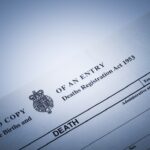
How do I register a death and obtain a death certificate for a family member?
Following the death of a family member, you will need to obtain a death certificate in order to make the funeral arrangements and to manage their estate.
Read moreWhen you lose someone, the first step will always be to register their death. After this point, many people are uncertain about what to do next. Dealing with someone’s estate can be a daunting process, especially at a time when you are grieving, but our expert probate lawyers are here to help guide you through.
The first thing you should do is ascertain whether the deceased left a will, as this determines who will be responsible for dealing with their estate and how it should be distributed.
If there is a will, there will likely be a copy amongst the deceased’s important papers. If you cannot find one after having conducted a thorough search, this does not necessarily mean that they did not leave a will.
You should also commission a will search which checks whether a will has been registered, as well as searching geographically amongst law firms and will writers local to the deceased, and placing a notice searching for the missing will.
If your search for a will is successful, you should contact the executor(s) appointed by the will.
If you are the named executor, obtaining probate will be your responsibility and you can appoint a solicitor to help you with this process. You may also decide not to take on the role of executor, however, this may have additional implications depending upon the terms of the will and you should seek advice before giving up your rights.
If someone else, or a company, has been named as the executor of the will, once you have contacted them and they are aware of their role, you need have no more involvement in the probate process as it becomes the executor’s responsibility.
If you are the executor, and this is a role you are happy to take on, you will need to notify certain people and companies that the death has occurred.
You must contact the deceased’s banks, building societies and any other companies which either hold money on the person’s behalf or to whom the person owed money. You will also need to notify any companies which paid income to the deceased, such as an employer, benefits agency, or pension provider, as well as any companies to which the deceased made regular payments, such as utility providers and their local council.
These days, most people have a variety of online accounts and these companies should also be notified of the person’s death. This might include email providers and social media accounts, as well as online shopping accounts and online payment accounts.
If the person held a passport or driving licence, the government should be notified of their death so that these can be cancelled. There may also be some health services the person received, such as dentistry or podiatry, and any upcoming appointments should be cancelled. If the deceased was provided with home care equipment by their local authority, this should be returned.
At this stage, you should also notify anyone who has been named in the will of their entitlement. You should be clear that you cannot confirm exactly how much they will receive until you have a full picture of the estate value, but it is important that you keep beneficiaries updated as to their entitlement and the progress of estate administration.
In order to notify all the relevant companies, you will need to gather the deceased’s paperwork to ascertain where bank accounts and other assets are held. If you have access to their property, you may be able to find the paperwork in their home. If not, you can apply to Royal Mail for a postal redirection so that as post is received you become aware of all the estate assets.
You can download our free probate checklist which will help you to consider the type of assets, liabilities, income, and expenditure the deceased might have had.
The expenditure incurred during probate is payable from the deceased’s assets. However, initially, you may not have access to estate funds to pay expenses. You should keep a record of any small items of expenditure (such as death certificates,
postage, and telephone calls) that you pay for so that these can be reimbursed once you have access to the deceased’s accounts.
Most major expenses should wait until estate funds are accessible. For example, you would not be expected to clear the deceased’s credit card using your personal funds. One expense that can be paid early on is the cost of the funeral. Again, you are not expected to cover this yourself, instead, you can ask the deceased’s bank to pay this direct by providing them with a copy of the funeral account.
Once you are in a position to begin collecting funds in and paying expenses out, you will need to open a separate executor’s bank account. If you instruct a solicitor to deal with the probate process on your behalf, they will arrange this for you.
If you are the executor of an estate and you are at all concerned about inheritance tax, we would be pleased to assist you, whether with one off advice or dealing with the probate process on your behalf.